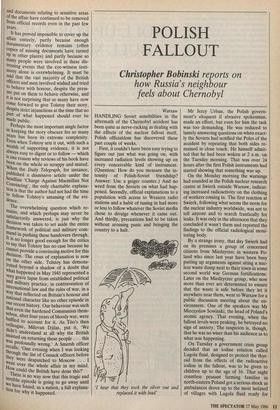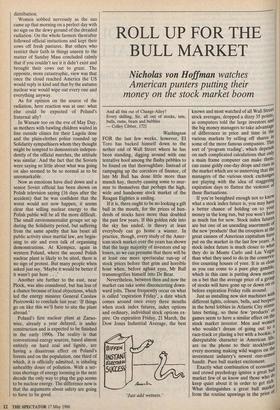POLISH FALLOUT
Christopher Bobinski reports on
how Russia's neighbour feels about Chernobyl
Warsaw HANDLING Soviet sensibilities in the aftermath of the Chernobyl accident has been quite as nerve-racking as dealing with the effects of the nuclear fallout itself, Polish officialdom has discovered these past couple of weeks.
First, it couldn't have been easy trying to figure out just what was going on, with increased radiation levels showing up on every conceivable kind of instrument. (Question: How do you measure the in- tensity of Polish-Soviet friendship? Answer: Use a geiger counter.) And no word from the Soviets on what had hap- pened. Secondly, official explanations to a population with access to Western radio stations and a habit of tuning in had more or less to follow whatever the Soviet media chose to divulge whenever it came out. And thirdly, precautions had to be taken without arousing panic and bringing the country to a halt.
'I hear that they took the silver out and replaced it with lead' Mr Jerzy Urban, the Polish govern- ment's eloquent if abrasive spokesman, made an effort, but even for him the task was too demanding. He was reduced to lamely answering questions on when exact- ly the Soviets had notified the Poles of the accident by repeating that both sides re- mained in close touch. He himself admit- ted that he had been woken at 2 a.m. on the Tuesday morning. That was over 24 hours after the first Polish instruments had started showing that something was up.
On the Monday morning the warnings had sounded at the Polish nuclear research centre at Swierk outside Warsaw, indicat- ing increased radioactivity on the clothing of workers coming in. The first reaction at Swierk, following what seems the norm for the nuclear industry worldwide, was not to tell anyone and to search frantically for leaks. It was only in the afternoon that they concluded it wasn't them and reported the findings to the official radiological moni- toring body.
By a strange irony, that day Swierk had on its premises a group of concerned citizens from Miedzyrzec in western Po- land who since last year have been busy putting up arguments against siting a nuc- lear waste dump next to their town in some second world war German fortifications. Later on the Miedzyrzec group, who now more than ever are determined to ensure that the waste is safe before they let it anywhere near them, went to Warsaw for a public discussion meeting about the en- vironment. One of the speakers was Mr Mieczyslaw Sowinski, the head of Poland's atomic agency. That evening, when the fallout levels were peaking, he betrayed no sign of anxiety. The suspicion is, though, that he was no wiser than his audience as to what was happening.
On Tuesday a government crisis group decided that an iodine solution called Lugola fluid, designed to protect the thyr- oid from the effects of the radioactive iodine in the fallout, was to be given to children up to the age of 16. That night countless peasant farming families in north-eastern Poland got a serious shock as ambulances drove up to the most isolated of villages with Lugola fluid ready for distribution.
Women sobbed nervously as the sun came up that morning on a perfect day with no sign on the dewy ground of the dreaded radiation. On the whole farmers thereafter followed official instuctions and kept their cows off fresh pastures. But others who restrict their faith in things unseen to the matter of Sunday Mass concluded calmly that if you couldn't see it it didn't exist and brought their cows out to graze. The opposite, more catastrophic, view was that once the cloud reached America the US would reply in kind and that by the autumn nuclear war would wipe out every one and everything anyway.
As for opinion on the source of the radiation, here reaction was at one: what else could be expected of Poland's fraternal ally?
In Warsaw too on the eve of May Day, as mothers with bawling children waited in line outside clinics for their Lugola dose and the plain-clothes police rounded up Solidarity sympathisers whom they thought might be tempted to demonstrate indepen- dently of the official marches, the attitude was similar. And the fact that the Soviets were saying so little about what was going on also seemed to be so normal as to be unremarkable.
Now as emotions have died down and a senior Soviet official has been shown on Polish television saying (16 days after the accident) that he was confident that the worst would not now happen, it seems clear that selling nuclear energy to the Polish public will be all the more difficult. The small environmentalist groups set up during the Solidarity period, but suffering from the same apathy that has beset all public activity since martial law, are begin- ning to stir and even talk of organising demonstrations. At Klempicz, again in western Poland, where the second Polish nuclear plant is likely to be sited, there is no sign of protest. But many people when asked just say, 'Maybe it would be better if it wasn't put here . .
Another site further to the east, near Plock, was also considered, but has less of a chance because of local objections, which led the energy minister General Czeslaw Piotrowski to conclude last year: 'If things go on like this we'll have to site the plant abroad.'
Poland's first nuclear plant at Zarno- wiec, already a year delayed, is under construction and is expected to be finished in the early 1990s. The reality is that conventional energy sources, based almost entirely on hard coal and lignite, are having a disastrous effect on Poland's forests and on the population, one third of which, it is officially admitted, is inhaling unhealthy doses of pollution. With a ser- ious shortage of energy looming in the next decade the only way to plug the gap seems to be nuclear energy. The difference now is that the arguments about safety are going to have to be good.



















































 Previous page
Previous page